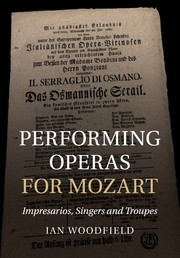Book contents
- Frontmatter
- Contents
- Illustrations
- Figures
- Tables
- Musical examples
- Abbreviations
- Introduction
- 1 Pasquale Bondini
- 2 Die Entführung aus dem Serail
- 3 The Italian troupe in Prague
- 4 The Prague Figaro
- 5 The genesis of Don Giovanni
- 6 The première of Don Giovanni
- 7 The casting of Don Giovanni
- 8 The Leipzig Don Giovanni
- 9 The 1788 Prague Don Giovanni
- 10 Mozart’s music in Leipzig
- 11 Josepha Duschek’s academy (22 April 1788)
- 12 Mozart’s academy (12 May 1789)
- 13 Guardasoni in Warsaw
- 14 The première of La clemenza di Tito
- 15 The Leipzig reception of the Da Ponte operas (1792–1794)
- 16 Guardasoni diversifies
- Conclusion
- Appendices
- Bibliography
- Index
6 - The première of Don Giovanni
Published online by Cambridge University Press: 05 January 2012
- Frontmatter
- Contents
- Illustrations
- Figures
- Tables
- Musical examples
- Abbreviations
- Introduction
- 1 Pasquale Bondini
- 2 Die Entführung aus dem Serail
- 3 The Italian troupe in Prague
- 4 The Prague Figaro
- 5 The genesis of Don Giovanni
- 6 The première of Don Giovanni
- 7 The casting of Don Giovanni
- 8 The Leipzig Don Giovanni
- 9 The 1788 Prague Don Giovanni
- 10 Mozart’s music in Leipzig
- 11 Josepha Duschek’s academy (22 April 1788)
- 12 Mozart’s academy (12 May 1789)
- 13 Guardasoni in Warsaw
- 14 The première of La clemenza di Tito
- 15 The Leipzig reception of the Da Ponte operas (1792–1794)
- 16 Guardasoni diversifies
- Conclusion
- Appendices
- Bibliography
- Index
Summary
Whether Guardasoni had prime responsibility for the original selection of the Don Juan theme remains unclear, but it is not in doubt that he oversaw the production of Don Giovanni, having assumed full control of the Italiänische Opera-Virtuosen as Unternehmer in the season during which it was given its première. Critiques of his regime were in general complimentary, painting a picture of a well-meaning individual cast in the same mould as his predecessor. A valuable appraisal of his qualities described him as ‘a hard-working, busy man who lives wholly for his company and who has enough discernment to run it properly’.
When Mozart arrived in Prague, it was immediately evident that his new opera was not going to be ready in time for 14 October. His rather unflattering comments on the impresario’s managerial style must be read in the light of the stress that he was under. An obvious substitute (Figaro) was to hand, and the Italiänische Opera-Virtuosen began to prepare this opera, although not apparently without some opposition. Mozart described how a cabal formed amongst those who took the view that the subject was unsuitable. Such was the influence of the ringleader that the local authorities apparently decided to forbid the performance altogether. In triumph, she called out one night from her box ‘I have won’ (‘hò vinta schrie Sie eines abends aus der Loge’). Mozart was delighted when this comment proved premature. A ruling arrived from Joseph II: if Don Giovanni was not ready, then ‘Figaro must be given!’ Volek identifies ‘Le Noble’ who brought the news as ‘Der k.k. Kammerfournier Hr. le Noble von Edlesberg’. The Prager Oberpostamtszeitung informed its readers that the final choice had been made by request. Mozart was contemptuous of the view that the subject matter of a celebratory opera should relate to the event itself. To him, all that mattered was the quality of the work and its novelty for the royal auditors. Nevertheless, the comments of Zinzendorf show that suitability remained an issue for many. When he first heard L’arbore di Diana on the occasion of its festive performance in Vienna, he did not seem perturbed by its content, commenting positively on the music, two of the singers and the sets. But when he heard the work again on 19 October, he offered the view that it was hardly decent for its purpose, and he felt the same about Figaro.
- Type
- Chapter
- Information
- Performing Operas for MozartImpresarios, Singers and Troupes, pp. 85 - 98Publisher: Cambridge University PressPrint publication year: 2011



